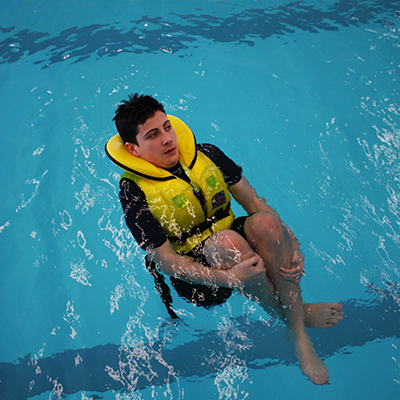Perform Basic Water Rescues Update*
ZBWRUP

Requirements
Royal Life Saving Society NSW is not a CRICOS provider; it is unable to provide national training to overseas students holding a student visa.
You are required to have a reasonable level of fitness, swimming ability and be comfortable in deep water to perform the required aquatic skills.
Course Description
The Basic Water Rescue course focuses on developing the participants’ survival and rescue skills enabling them to make the correct decisions in an aquatic emergency. This training will enhance your personal survival skills while providing you with the knowledge and skills to develop the level of judgement‚ technique and physical ability required to safely perform aquatic rescues. The lifesaving skills learnt and developed through the program are a great introduction to becoming a Pool Lifeguard or Swimming Instructor.
This course contains delivery and assessment of the skills and knowledge required to perform cardiopulmonary resuscitation (CPR).
Pre-Course Learning
This course requires the completion of a workbook prior to attendance at the course. Only those who have completed the workbook will be able to attend the practical component of this course. The workbook and manual will be posted to you within 48 hours of enrolment (Study time: recommended 5 hours).
Course Theory
The course covers a range of water safety topics including safe water practices; survival in the water; self-preservation; recognising an emergency; assessment before and during a rescue; priorities for rescue; resuscitation; acceptance of responsibility; use of bystanders; emergency care; and contacting emergency services.
Practical Assessments Include
- Resuscitation: Demonstrate effective CPR.
- Survival and Rescue Skills: Demonstrate a range of survival techniques and appropriate rescues for a range of different aquatic environments and scenarios.
- Complete the following rescues: reach, rope throw, throw flotation aid
- Complete the following 10m swimming rescues with a person in difficulty: accompanied, wade, non-contact tow, contact tow.
- Spinal Injuries: Basic management of a suspected spinal injury in shallow water.
- Rescue Scenario: Demonstrate initiative in completing a rescue of two people who are in difficulty up to 15 metres from safety.
- Contextualized aquatic emergency recognition, assessment, response, and communication in an aquatic emergency including injury and incident reporting.
Outcomes
To achieve a Statement of Attainment, candidates must successfully complete the practical components under the award conditions.
Upon successful course completion of the course participants will be issued with a Nationally Recognised Training certificate (Statement of Attainment). Units of Competency achievable through this course include:
- HLTAID001 Provide Cardiopulmonary Resuscitation
- SISCAQU002 Perform Basic Water Rescues
Candidates are required to bring:
- Long sleeve shirt and long pants for wearing in the water
- Photo Identification
- Pen and paper for note taking
- Swimwear and towel
- Goggles and swim cap (if preferred)
- Comfortable clothing is recommended
- Meals are not provided; it is recommended that you bring an adequate amount of food and drink for your course. Some venues may or may not be near food outlets.
COVID-19 Information:
In order to make sure we are conducting training as safely as possible, and to protect our learners and trainers, Royal Life Saving has implemented some changes to the way we facilitate our Face to Face workshops. We have:
- Made hand hygiene facilities available at our training venues;
- Increased cleaning frequencies and standards for general spaces and equipment;
- Decreased group sizes;
- Introduced physical distancing as per current Government restrictions;
- and Mandated the completion of Infection Control learning modules for all staff and trainers.
At your course you can expect:
- To be asked to complete a Verbal Health Assessment, and Temperature check;
- To be asked to wash/ sanitise your hands prior to entering the training space;
- To be provided adequate personal space in order to maintain required physical distances from others;
- To perform practical assessment tasks on yourself or on a manikin (not on others);
- To be asked to excuse yourself from the training space if you declare yourself to be unwell, or begin displaying flu-like signs;
- To be asked to wash/sanitise your hands before leaving the workshop.
These changes will help to keep everybody safe and they form part of our Terms and Conditions for participation. If you think you may have any difficulty complying with these changes, please contact your local Royal Life Saving office at your earliest convenience.
Introduction:
Learning Outcomes:
Program Benefits:
Content:
Upcoming Workshops
| Name | Date | Time | Location | Available Spaces | Cost |


